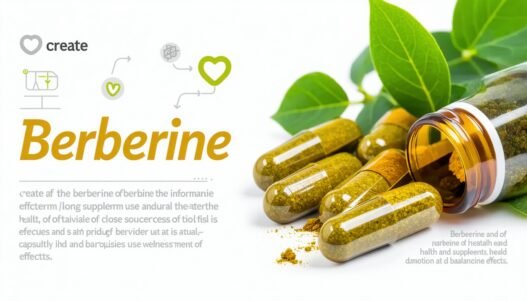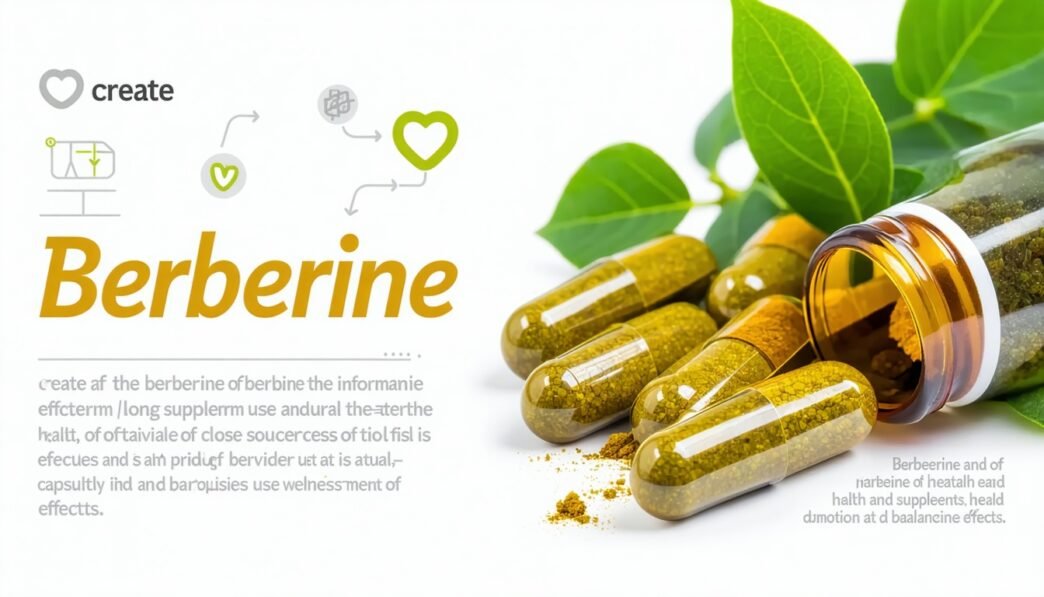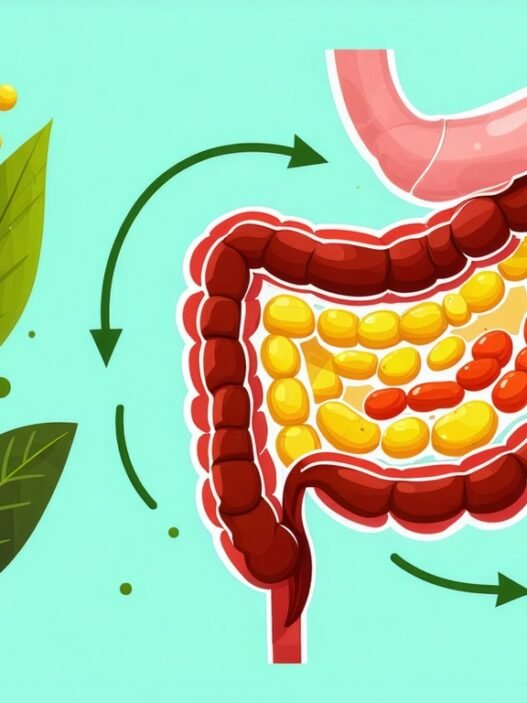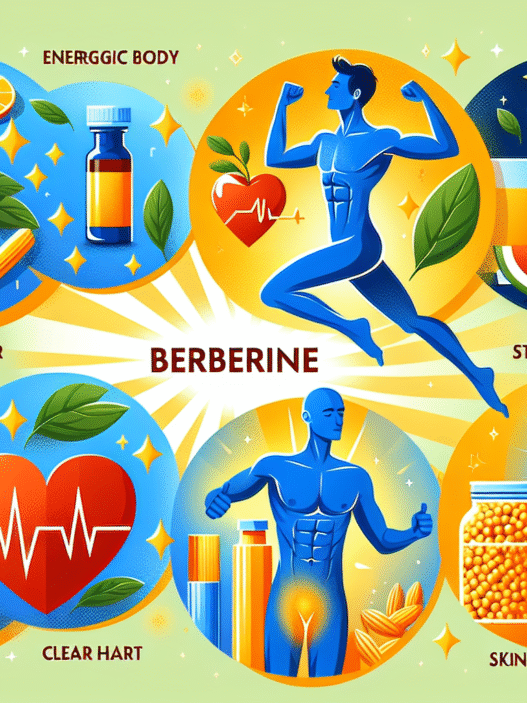Understanding Berberine
Overview of Berberine
Berberine is a bioactive compound isolated from Coptis chinensis, a plant used extensively in traditional Chinese medicine. This compound is recognized for its diverse pharmacological activities. Research indicates that berberine can help lower blood glucose levels, enhance insulin sensitivity, combat hyperlipidemia, and even prevent mild cognitive impairment.
Berberine works at the cellular level, positively influencing various metabolic pathways, which makes it an appealing option for those pursuing holistic wellness. Many individuals interested in functional medicine seek out berberine for its wide array of health benefits.
Pharmacological Activities
The pharmacological actions of berberine are quite impressive. Below is a table summarizing its key effects on different health parameters:
| Health Parameter | Effect of Berberine |
|---|---|
| Triglycerides (TG) | Reduction |
| Total Cholesterol (TC) | Reduction |
| Low-Density Lipoprotein (LDL) | Reduction |
| High-Density Lipoprotein (HDL) | Increase |
| Fasting Plasma Glucose (FPG) | Reduction |
| Insulin Resistance | Improvement |
Berberine’s capacity to reduce triglycerides, total cholesterol, and low-density lipoprotein, while increasing high-density lipoprotein, showcases its potential in managing obesity and hyperlipidemia. Furthermore, it has been documented to improve insulin resistance, supporting its role in managing type 2 diabetes and preventing complications like diabetic encephalopathy.
In addition to metabolic health, berberine exhibits anti-inflammatory properties by inhibiting cyclooxygenase-2 (COX-2) and prostaglandin E2. This mechanism allows berberine to potentially mitigate inflammation-related diseases by modulating various inflammatory pathways, including the NF-κB signaling pathway.
Furthermore, berberine has been investigated for its anticancer properties. It has shown the ability to induce apoptosis, affect cell cycle regulation, and impact lipid metabolism, making it a candidate for future cancer therapies.
This overview of berberine highlights its therapeutic potential and raises questions about what happens if you take berberine for too long? in terms of long-term health impacts and safety. To learn more about the benefits and effects of berberine, consider visiting our article on what are the benefits of taking berberine?.
Interactions and Side Effects
Understanding the potential interactions and side effects of berberine is crucial for those considering its long-term use. Here, we explore how berberine can interact with medications, potential side effects, and precautions for specific groups.
Berberine and Medication Interactions
Berberine has the potential to interact with several medications due to its effects on liver metabolism. It can alter the breakdown rates of drugs processed by the liver, which may change both their effects and side effects. Common medications that may interact with berberine include:
| Medication Category | Interaction Effects |
|---|---|
| Antidiabetes Drugs | Increases risk of hypoglycemia |
| Blood Pressure Medications | May alter metabolism |
| Sedative Medications | Potential increased effects |
| Antibiotics | Changes efficacy and absorption |
It is essential for anyone on these medications to consult with a healthcare provider before considering berberine supplements. Additionally, berberine may slow blood clotting, which can increase the risk of bruising and bleeding when combined with other anticoagulants.
Potential Side Effects
While many individuals can tolerate berberine well, there are some potential side effects to be aware of. Commonly reported side effects include:
| Side Effect | Description |
|---|---|
| Gastrointestinal Issues | Includes diarrhea, constipation, and stomach upset |
| Low Blood Sugar | May cause symptoms of hypoglycemia, especially when combined with other blood sugar-lowering medications |
| Liver Effects | Prolonged use may affect liver enzymes (is berberine bad for kidneys or liver?) |
Individuals should monitor their body’s responses and discontinue use if severe side effects occur. Always consult a healthcare professional for advice tailored to individual health situations.
Caution for Specific Groups
Certain populations should use caution when considering berberine. This includes:
- Pregnant or Nursing Women: Limited research is available, and the effects on the fetus or infant are not fully understood.
- Individuals with Liver Conditions: Since berberine can affect liver metabolism, those with existing liver issues should avoid it or only use it under medical supervision.
- Those on Multiple Medications: The risk of interaction increases with the number of medications taken. Consulting with a healthcare provider is recommended.
To ensure safe use, consider factors such as weight loss goals and the need for what to avoid while taking berberine?. Monitoring how berberine affects hormones may also be necessary (what does berberine do to hormones?).
Understanding these interactions and side effects can help individuals make informed decisions regarding long-term berberine use and promote a safer approach to health and wellness.
Health Benefits of Berberine
Berberine has gained attention for its various health benefits, particularly in managing conditions related to blood sugar levels, blood pressure, and liver health. This section delves into how berberine can positively impact these aspects of health.
Impact on Blood Sugar Levels
Studies indicate that berberine can significantly affect blood sugar management. Daily doses ranging from 600 to 2,700 mg have been shown to reduce fasting and long-term blood sugar levels by up to 20% and 12%, respectively. These effects are especially pronounced when berberine is taken in conjunction with diabetes medications. In fact, research suggests that berberine may be as effective as traditional blood sugar drugs, such as metformin, rosiglitazone, and glipizide.
| Dosage Range (mg) | Effect on Fasting Blood Sugar | Effect on Long-Term Blood Sugar |
|---|---|---|
| 600 – 2,700 | Up to 20% reduction | Up to 12% reduction |
It’s essential for individuals who are on diabetes medications to closely monitor their blood sugar levels when taking berberine, as the combination may lead to excessively low blood sugar levels (WebMD).
Effects on Blood Pressure
Berberine’s ability to lower blood pressure can be particularly beneficial for those with hypertension. However, it’s important to note that it may also lead to hypotension, where blood pressure drops to dangerous levels. Individuals taking high blood pressure medications should particularly be cautious and regularly monitor their blood pressure to prevent complications.
The potential blood pressure-lowering effects of berberine make it a valuable addition to the treatment arsenal for those struggling with high blood pressure. While it can be effective, it’s vital for users to maintain awareness of their blood pressure levels, especially when combined with other medications.
Liver Health and Inflammation
Berberine is known for its supportive role in liver health and its anti-inflammatory properties. Although specific studies focused on liver health through berberine supplementation are still emerging, the compound is believed to exert positive effects on liver function, potentially reducing inflammation and supporting overall metabolic processes. It is advisable to consider potential interactions and effects on the liver, as mentioned in our article on is berberine bad for kidneys or liver?.
Overall, berberine showcases promising health benefits, yet proper monitoring and consultation with healthcare professionals are recommended, especially for individuals with existing health conditions or those on medication.
Long-Term Effects of Berberine
Understanding the long-term use of berberine is essential for those exploring its potential benefits. This section covers the therapeutic effects over time and discusses safety considerations to ensure informed use.
Therapeutic Effects Over Time
Research indicates that the therapeutic effects of berberine significantly increase with prolonged use. It has shown effective results after a treatment period of over three months. Users have reported reductions in triglycerides (TG), total cholesterol (TC), low-density lipoprotein (LDL), and improvements in fasting plasma glucose (FPG) and insulin resistance.
| Effect Duration | Improvements Noted |
|---|---|
| 1 Month | Initial reductions in lipid levels |
| 3 Months | Significant reductions in TG, TC, LDL; improved metabolic parameters |
| 6 Months+ | Continued improvement in vascular health and inflammation reduction |
Additionally, berberine’s vascular protective effects have been documented in various studies. It has been shown to mitigate the risks of atherosclerosis, cerebrovascular disease, and complications arising from diabetes. For those looking for enhanced metabolic health, what are the benefits of taking berberine? offers more insight.
Safety and Adverse Reactions
Generally, berberine is considered safe for long-term use with few reported adverse reactions. However, individuals should be cautious and aware of potential side effects. Though rare, some users may experience digestive issues such as diarrhea or constipation. It is also important to consider interactions with other medications, especially for those already on treatments for metabolic disorders.
| Potential Side Effects | Frequency |
|---|---|
| Digestive Issues (diarrhea, constipation) | Occasional |
| Hypoglycemia (for those on diabetes medications) | Rare |
Certain specific groups, including pregnant or breastfeeding women, should approach berberine use with caution. Individuals with liver or kidney issues should also consult a healthcare professional before starting supplementation, addressing concerns such as is berberine bad for kidneys or liver?.
When integrating berberine into a health regimen, monitoring dosage and effects is advisable. Should any adverse reactions occur, discontinuing use and consulting a healthcare provider is recommended. Overall, long-term usage of berberine shows promise but must be approached with awareness and care to maximize benefits while minimizing risks.
Metabolism and Absorption
Understanding how berberine is metabolized and absorbed in the body is essential for those considering its long-term use. The effectiveness of berberine can be influenced significantly by its metabolic pathways and bioavailability.
Modes of Metabolism
Berberine undergoes extensive metabolism, primarily in the liver and intestines. In vivo studies indicate that it can be rapidly metabolized into various metabolites, with all nine metabolites detected. The pharmacokinetic details illustrate that not only is berberine metabolized in the liver but also impacted by gut microbiota.
The process can be broken down into phases:
- Phase I Metabolism: Involves modifications like oxidation and reduction, resulting in intermediate metabolites.
- Phase II Metabolism: Involves conjugation reactions (e.g., glucuronidation), resulting in metabolites that are more water-soluble and can be excreted efficiently.
The results show that phase II metabolites are significantly more abundant in circulation than phase I metabolites, highlighting their role in berberine’s overall bioavailability.
Bioavailability and Absorption Rates
Berberine exhibits poor oral absorption, which is a crucial factor for its effectiveness as a supplement. The absolute bioavailability of berberine is notably low, recorded at approximately 0.37% in clinical settings. Additionally, animal studies show an even lower bioavailability rate of about 0.36% in rats.
The overall recovery of berberine and its metabolites from urine, bile, and feces is around 41.2%, indicating that substantial amounts are metabolized before they can exert their effects.
| Parameter | Value |
|---|---|
| Absolute Bioavailability | 0.37 ± 0.11% |
| Recovery Rate | 41.2% |
| Bioavailability in Rats | 0.36% |
Given these metabolic characteristics, individuals interested in the long-term use of berberine should consider factors such as dosing, timing, and potential interactions to optimize its beneficial effects. Many ask, what happens if you take berberine for too long?. Understanding how berberine is processed in the body might help mitigate concerns regarding its longevity in usage.
Vascular Protective Effects
Berberine has garnered attention in the realm of functional medicine for its potential vascular protective effects. Research suggests that this compound may benefit cardiovascular health and offer protection against atherosclerosis, among other conditions.
Cardiovascular Benefits
In experimental studies, berberine has shown promising cardiovascular benefits, including improvements in inflammatory cytokines and reductions in oxidative stress. In animal models, berberine administration led to significant enhancement in cardiac function post-myocardial ischemia/reperfusion (MI/R) injury. The activation of specific signaling pathways, such as SIRT-1, plays a crucial role in these cardioprotective effects, assisting in the recovery of heart function and reducing infarct size.
Moreover, berberine demonstrates efficacy in inhibiting the proliferation of vascular smooth muscle cells, a critical factor in maintaining vascular health. This was observed in studies where berberine targeted the PPAR-α–nitric oxide signaling pathway (PMC).
| Cardiovascular Effects | Result |
|---|---|
| Inflammatory Cytokines Improvement | Yes |
| Oxidative Stress Reduction | Yes |
| Myocardial Tissue Recovery | Enhanced |
| Smooth Muscle Cell Proliferation Inhibition | Yes |
Protection Against Atherosclerosis
The potential of berberine in preventing atherosclerosis is underscored by its effects on lipid metabolism. Studies indicate that berberine administration can lead to a reduction in lipid levels in both serum and liver, which is essential in mitigating atherosclerosis. Additionally, it has been found to improve intima-media thickness and restore vascular endothelium-dependent vasodilation.
The mechanisms behind these protective effects include modulation of gene expression linked to AMPK and NF-κB pathways. By influencing the interaction between adipocytes and macrophages, berberine helps alleviate the lesions associated with atherosclerosis (PMC).
| Atherosclerosis Effects | Result |
|---|---|
| Lipid Level Reduction | Yes |
| Intima-Media Thickening Improvement | Yes |
| Endothelium-Dependent Vasodilation Restoration | Yes |
| Atherosclerosis Lesion Alleviation | Yes |
Berberine’s cardiovascular benefits and protective actions against atherosclerosis highlight its potential role in supporting vascular health. To learn more about the other health benefits of berberine, visit our article on what are the benefits of taking berberine?.





















